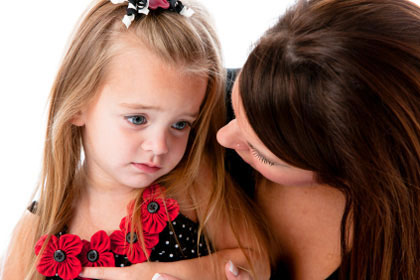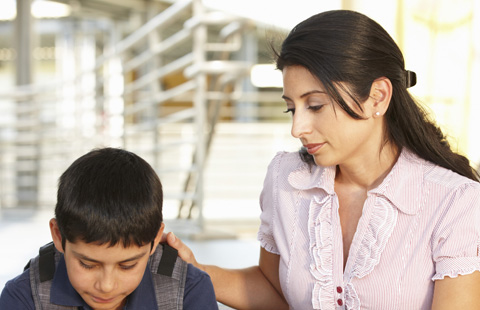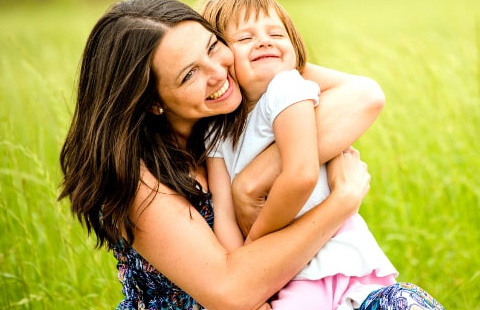Divorce is hard on the entire family, especially children. They need some time to adjust to their parents living separately. Read on for some tips to help your child deal with the stress. Have you ever heard the saying marriage is not a bed of roses? All married couples have their share of ups and downs, but manage to resolve their issues without resorting to separation. However, not all issues can be resolved easily. You may have encountered issues that left you no other option but divorce. When you get a divorce, this is an extremely stressful time not only for you and your spouse, but also for your child. A divorce is the beginning of a completely new life for him. He has to adjust to his parents living separately. He may also have to deal with seeing one parent only on weekends or holidays. Parents must be more sensitive to their childs feelings at this time. Both parents must keep an eye on him to know how he is dealing with the situation. This is a time when your child will be plagued by feelings of doubt about his position in the family. As a parent, it is your job to reassure him that a divorce has not changed the love you have for him. In this articleAngerShockAnxietyAnger Children often do not understand why their parents have to get a divorce. They find it difficult to express their displeasure for being put into such a situation. Anger becomes an outlet for their frustrations. This could be in the form of resentment or outright rage. There may be occasions when your child blames you for destroying his normal life. Understand that he is merely venting his frustrations. When a child is upset, he will usually express himself through anger or by acting out. If your child is angry, give him an opportunity to express what he is feeling. Reassure your child that it is okay for him to be angry and he will not be punished for it. When he expresses his anger, listen to him. Even if he accuses you of being responsible for whatever has happened, do not respond to his anger. Remember that he does not actually mean it and is merely looking for a way to cope with what is happening. If your child is angry, do not make any false promises in order to pacify him. You cannot fix a situation which is not fixable. You will get his hopes up only to dash them. In such a situation, your child will feel betrayed. This will cause him to become angrier. No matter how much you want to make things right, some problems do not have easy solutions. Shock Your child may have witnessed you and your spouse arguing with each other repeatedly. No matter how much you fought, he would never have expected his parents to take such an extreme step. When you first speak to him about you and your spouse getting a divorce, his reaction is likely to be one of shock. It is going to take some time before he is even ready to acknowledge the situation. You can help your child cope with the stress. Firstly, give him time to adjust. This involves being patient with him. In the initial stages, he may sometimes want to be left alone. Do not force him to go out and interact with people if he does not want to. Constantly remind him that you love him. He needs to be reassured that no matter what happens between his parents, they will continue to feel the same way about him. If there are going to be changes made to your childs daily routine, go about them slowly. Try to introduce him to these changes one at a time. If he is not comfortable with a specific change in his schedule, talk to your spouse and see if it can be put off for some time. Anxiety Anxiety is another emotion that your child will have to deal with. Even at the happiest of times, your child will always have some worries. During a divorce, even simple fears can get magnified. Your child is likely to link every small worry to his feelings about you. Whenever your child tells you he is afraid of something, do not dismiss his fears. Listen to him, even if he is simply repeating them. Be supportive. If your child raises his fears about something that is probably going to happen, respond to his queries. Try to be as gentle as possible, so that he does not get alarmed. It also helps to establish a routine in his life. He will most likely cope better if he knows exactly where he is going and will be in a familiar place, with people who are known to him. Even if you try your best to support your child, there may be instances where you cannot help him. If your child starts displaying violent behaviour or becomes uncontrollable, he may be a danger to himself as well as people around him. In such a scenario, your child will need professional help. A qualified therapist will be better able to help him deal with his emotions.
Divorce is hard on the entire family, especially children. They need some time to adjust to their parents living separately. Read on for some tips to help your child deal with the stress. Have you ever heard the saying 'marriage is not a bed of roses'? All married couples have their share of ups and downs, but manage to resolve their issues without resorting to separation. However, not all issues can be resolved easily. You may have encountered issues that left you no other option but divorce.
When you get a divorce, this is an extremely stressful time not only for you and your spouse, but also for your child. A divorce is the beginning of a completely new life for him. He has to adjust to his parents living separately. He may also have to deal with seeing one parent only on weekends or holidays.
Parents must be more sensitive to their child's feelings at this time. Both parents must keep an eye on him to know how he is dealing with the situation. This is a time when your child will be plagued by feelings of doubt about his position in the family. As a parent, it is your job to reassure him that a
divorce has not changed the love you have for him.
Anger
Children often do not understand why their parents have to get a divorce. They find it difficult to express their displeasure for being put into such a situation.
Anger becomes an outlet for their frustrations. This could be in the form of resentment or outright rage. There may be occasions when your child blames you for destroying his normal life. Understand that he is merely venting his frustrations.
When a child is upset, he will usually express himself through anger or by acting out. If your child is angry, give him an opportunity to express what he is feeling. Reassure your child that it is okay for him to be angry and he will not be punished for it. When he expresses his anger, listen to him. Even if he accuses you of being responsible for whatever has happened, do not respond to his anger. Remember that he does not actually mean it and is merely looking for a way to cope with what is happening.
If your
child is angry, do not make any false promises in order to pacify him. You cannot fix a situation which is not fixable. You will get his hopes up only to dash them. In such a situation, your child will feel betrayed. This will cause him to become angrier. No matter how much you want to make things right, some problems do not have easy solutions.
Shock
Your child may have witnessed you and your spouse arguing with each other repeatedly. No matter how much you fought, he would never have expected his parents to take such an extreme step. When you first speak to him about you and your spouse getting a divorce, his reaction is likely to be one of shock. It is going to take some time before he is even ready to acknowledge the situation.
You can help your child cope with the
stress. Firstly, give him time to adjust. This involves being patient with him. In the initial stages, he may sometimes want to be left alone. Do not force him to go out and interact with people if he does not want to. Constantly remind him that you love him. He needs to be reassured that no matter what happens between his parents, they will continue to feel the same way about him.
If there are going to be changes made to your child's daily routine, go about them slowly. Try to introduce him to these changes one at a time. If he is not comfortable with a specific change in his schedule, talk to your spouse and see if it can be put off for some time.
Anxiety
Anxiety is another emotion that your child will have to deal with. Even at the happiest of times, your child will always have some worries. During a divorce, even simple
fears can get magnified. Your child is likely to link every small worry to his feelings about you. Whenever your child tells you he is afraid of something, do not dismiss his fears. Listen to him, even if he is simply repeating them.
Be supportive. If your child raises his fears about something that is probably going to happen, respond to his queries. Try to be as gentle as possible, so that he does not get alarmed. It also helps to establish a routine in his life. He will most likely cope better if he knows exactly where he is going and will be in a familiar place, with people who are known to him.
Even if you try your best to support your child, there may be instances where you cannot help him. If your child starts displaying violent behaviour or becomes uncontrollable, he may be a danger to himself as well as people around him. In such a scenario, your child will need professional help. A qualified therapist will be better able to help him deal with his emotions.
































